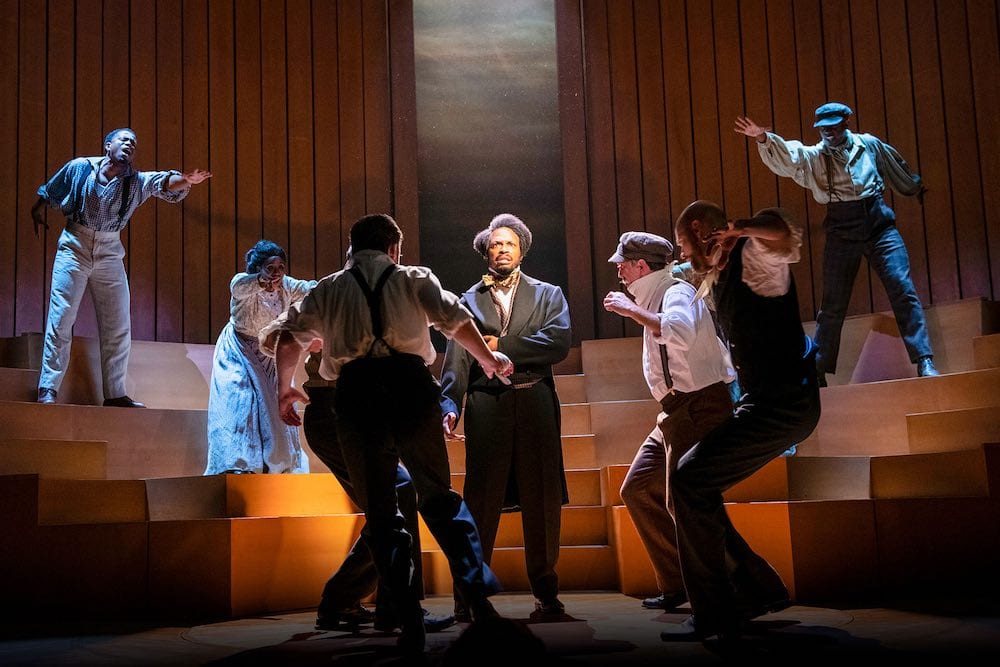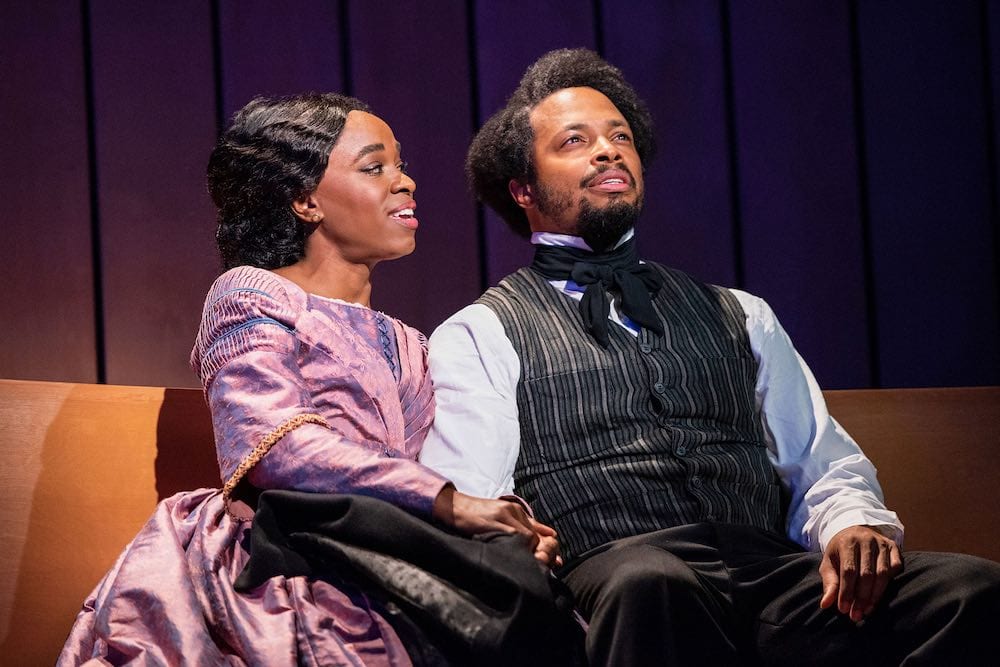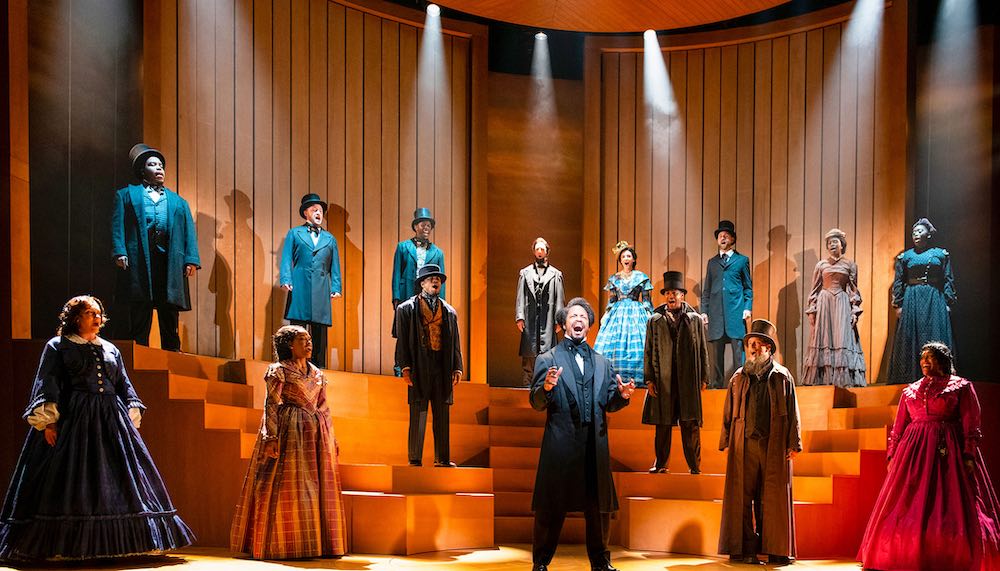The first thing the audience sees in Arena Stage’s world premiere musical American Prophet is Frederick Douglass standing alone, motionless, framed in the central portal on the highest level of Arnulfo Maldonado’s amphitheater-like set. It is as if he is already poised atop the pedestal on which, as one of America’s greatest heroes, history has rightfully placed him.
How he got there, and what his journey felt and sounded like, is the subject of American Prophet. When Douglass (Cornelius Smith Jr.) speaks, he does so in words that Charles Randolph-Wright and Marcus Hummon selected from Douglass’ prodigious writings. Smith’s eloquent delivery of Douglass’ words, such as his famous “Fourth of July” speech, is as good a representation of the power of Douglass’ rhetoric as a 21st-century audience is likely to encounter in person.

The book’s structure is a kind of highlight reel of Douglass’ biography. In often brief scenes, Douglass leads the audience through key events and people in his story, from an enslaved boyhood on the Eastern Shore to White House meetings with President Lincoln. “Memory is freedom,” Douglass says at one point, and the partial memory-play format is a useful device to chart the path he followed in his “insurgent years” through to the end of the Civil War. (The play does not address the very full 30 years Douglass lived after the end of the war.) It’s a chronicle that sometimes plays like a pageant, as ensemble members on different levels of the set illustrate or participate in various moments in Douglass’ life.
Douglass’ life — centered on the fight to end slavery — is highly dramatic in its own right, yet American Prophet’s most dramatically effective scenes are those with his wife Anna Murray Douglass (Kristolyn Lloyd). Relatively little has been said about her: she left no writings, and Douglass’s three autobiographies barely mention her. Even in her own time, she was often denigrated as an unworthy companion to a great man. Randolph-Wright (director and book co-author) and Marcus Hummon (book co-author, music and lyrics writer) set out to remedy this historical oversight.
In this, they succeed. Duets between Frederick and Anna — “Children of the Same River” and “Let the Storm Come” — express their deep feelings of love and commitment to their cause and to one another. Smith and Lloyd sing them spectacularly well. Lloyd’s take on the strains of loving a man who belongs to the world in “I Love a Man” is equally compelling.
Their dialogue scenes underline the importance of Anna’s role. She motivates Frederick to escape, enabling his journey north by putting together a sailor disguise. Active in the abolitionist movement, she provides an “underground railroad” safe house as enslaved people seek escape to free states or Canada. With Frederick spending the bulk of his time on the road, she manages the household and raises their five children mostly by herself. She stands up for herself, as when she lets her husband know that a British woman who has lived in their house while acting as Frederick’s editor needs to find new lodgings.

“It’s fair to say,” comments Hummon in a program note, “that without [Anna], there is no Frederick Douglass as we understand him.” Dramaturg Otis Ramsey-Zöe adds that “Anna’s role reminds us that the necessary liberatory work is often work done in silence and unseen.” Her importance in American Prophet goes beyond her importance to the work of antislavery. In creating a fleshed-out, well-imagined portrait of Anna, Randolph-Wright and Hummon also give her husband, that most public of men, a private life worth caring about.
Among the supporting characters, Cicily Daniels stands out as Betsey Bailey, Douglass’ grandmother, who beautifully sings a maternal piece, “If I Were Your Mother.” As John Brown, Chris Roberts sings a passionate “Hands” as he inspires violent resistance to the slave power. The warm, almost fraternal, relationship between Brown and Douglass is sundered as Douglass, in a striking moment, refuses to join Brown’s doomed Harpers Ferry raid. Brown’s religious fanaticism is somewhat underemphasized, while the portrayals of William Lloyd Garrison and Lincoln (both played by Thomas Adrian Simpson), even if accurate in terms of the words that were spoken, verge on caricature.

The singing of the entire cast is top-notch throughout. Hummon’s songs fall, for the most part, squarely within the contemporary Broadway lyrical and power ballad styles, some with a country inflection (Hummon has worked extensively in that genre). Hummon’s approach may be traditional, in this sense, but the music’s most important subject matter is the revolutionary power of Douglass’ speaking and writing. Douglass begins by setting the terms of his lifelong quest: “What Does Freedom Look Like?” In the “American Prophet” and “We Need a Fire,” Douglass conveys his passion for freedom and the fire, storm, and earthquake that it will take to achieve it.
For Randolph-Wright and Hummon, saying that Douglass is a “prophet” means that he is not someone who predicts the future but rather someone who, by forcefully and unrelentingly speaking hard truths to power, changes that future. Randolph-Wright and Hummon emphasize the contemporary impact of Douglass’ words: “Agitate! Agitate! Agitate!” Necessary in mid-19th-century America, necessary in 2022. Arena’s production of American Prophet tells that truth in an unforgettably powerful way that the opening night audience found inspiring.
Running Time: Two hours 15 minutes, including one 15-minute intermission.
American Prophet: Frederick Douglass in His Own Words plays through August 28, 2022, in the Kreeger Theater at Arena Stage, 1101 6th Street SW, Washington, DC. Tickets ($66–$115, depending on performance) may be purchased online, by calling 202-488-3300, or at the Arena Stage sales office Tuesday through Saturday from noon until 8 p.m. For information on programs such as pay-your-age tickets, student discounts, Southwest Nights, and hero’s discounts, visit arenastage.org/tickets/savings-programs.
The American Prophet program is online here.
GalaPro closed captioning is available.
Audio-described performance: Saturday, August 6 at 2 p.m
COVID Safety: Photo identification and proof of vaccination against COVID-19 must be shown to enter the building and masks must be worn in the building. Arena’s complete safety protocols are here.
American Prophet: Frederick Douglass in His Own Words
Book by Charles Randolph-Wright and Marcus Hummon
Music and Lyrics by Marcus Hummon
Directed by Charles Randolph-Wright
Choreographed by Lorna Ventura
Music Direction, Orchestrations, and Additional Arrangements by Joseph Joubert
SEE ALSO:
Arena Stage announces 2022/23 season, Molly Smith’s 25th as artistic director




